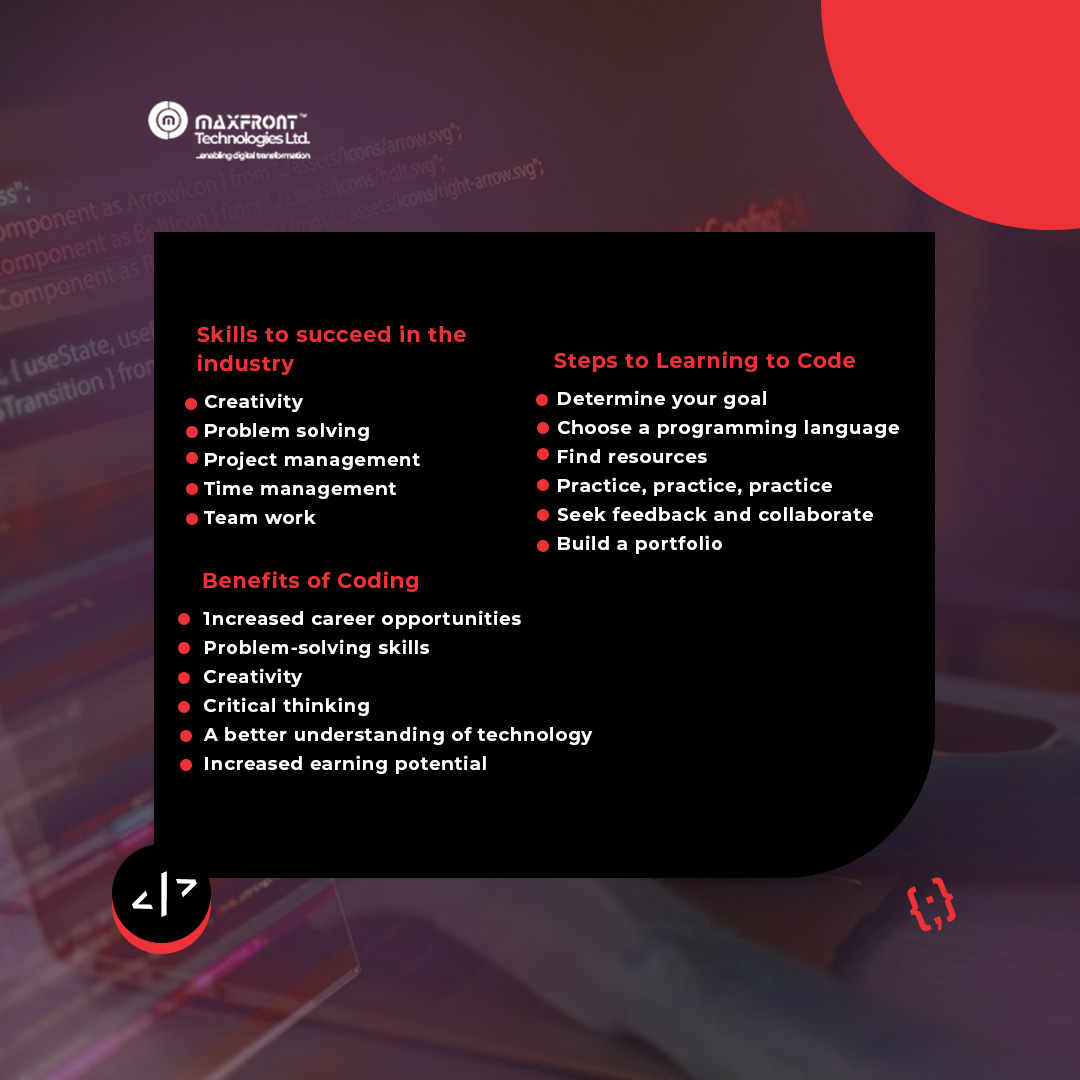
Learning to code can seem daunting, especially if you don’t have a strong background in math. However, the truth is that you don’t have to be a math whiz to learn to code. While math skills can certainly be helpful in certain aspects of coding, many other skills and abilities are just as essential. Some of the most successful coders come from non-mathematical backgrounds.
What’s most important when learning to code is a willingness to learn, an ability to think logically and critically, and a determination to solve problems. These skills can be developed through practice, trial and error, and exposure to different programming languages and frameworks.
Whether you’re interested in building websites, developing mobile apps, or creating software applications, learning to code is a valuable skill that can open up many doors in the tech industry. So don’t let a lack of math proficiency hold you back – with the right mindset and resources, anyone can learn to code.
Learning to code is becoming increasingly important due to the high demand for tech skills and the ability to build and maintain software applications, websites, and other digital products. It can also help to improve problem-solving skills, creative expression, understanding of technology, and future-proofing your career. Learning to code can provide valuable skills that can enhance career prospects, improve problem-solving abilities, and allow you to express your creativity through technology.
Many tech professionals speak in 0s and 1s, but we have some good news for you if you want to work with complex equations regularly. As a tech professional, you will apply some math, but you do not need to be an expert in the subject to learn how to code. Basic math and statistics knowledge is sufficient for the majority of IT professions. Therefore you don’t need sophisticated math skills to flourish as a tech professional.
You’ll require the following skills to succeed in the industry:
- Creativity
- Problem-solving
- Project management
- Time management
- Teamwork
While having a good foundation in math can be helpful in specific tech-related fields, it is not necessarily a requirement to have a successful career in technology. Many tech roles involve problem-solving and critical thinking, and while math can undoubtedly help with these skills, it is not the only way to develop them.
The tech industry has many career paths, some requiring more math skills than others. For example, software engineering or data science roles may require a strong foundation in math and statistics. On the other hand, roles such as user experience (UX) design, product management, or technical writing may require less math proficiency.
It’s important to note that even if you don’t have a strong background in math, you can continuously improve your skills through education and practice. Many online resources, such as tutorials and courses, can help you develop your math skills.
Ultimately, the most important factor in having a successful career in tech is your passion and interest in the field. If you are willing to try to learn and grow, you can succeed in a tech career regardless of your math abilities.
Benefits of Coding
There are many benefits to learning how to code, and it offers a wide range of benefits that can improve your career prospects, problem-solving skills, creativity, and overall understanding of technology. Here are some of the key advantages:

- Increased career opportunities: In today’s digital world, there is a growing demand for individuals with coding skills. Learning to code can lead to various career opportunities in software development, web development, mobile app development, data science, and more.
- Problem-solving skills: Coding requires logical and analytical thinking and breaking down complex problems into smaller, more manageable parts. Developing these skills can improve your problem-solving abilities, which can be valuable in all areas of life.
- Creativity: Coding, as a form of creative expression, allows you to build and design something from scratch. Seeing your ideas through a website, app, or software program can be incredibly satisfying.
- Critical thinking: Coding also requires critical thinking, as you need to identify and solve problems that arise during the development process. This can help improve your overall necessary thinking skills.
- A better understanding of technology: Understanding how technology works can benefit your personal and professional life. Learning to code can help you better understand how software and hardware work together, which can be helpful when troubleshooting technology issues.
- Increased earning potential: Many jobs in the tech industry come with higher salaries and opportunities for growth. By learning to code, you can position yourself for a high-paying job in a growing field.
Steps to Learning to Code
Learning to code is a continuous process, and it can take time to become proficient. When you set goals, choose the right resources, and practice consistently, you can develop the skills necessary to become a successful coder. Here are some general steps to get started with learning to code:
- Determine your goals: Before diving into coding, it’s essential to determine why you want to learn to code and what you hope to accomplish. Do you want to build a website? Create a mobile app? Develop software programs? Understanding your goals will help you choose the correct programming language and resources to get started.
- Choose a programming language: There are many programming languages to choose from, each with its strengths and weaknesses—some popular languages include Python, JavaScript, Java, Ruby, and C++. Research the languages that align with your goals and interests to find the best fit.
- Find resources: There are many online resources available for learning to code, such as online courses, tutorials, and coding boot camps. Consider your learning style and choose resources that align with your preferences. Some popular websites for learning to code include Codecademy, Udemy, and Coursera.
- Practice, practice, practice: Learning to code requires consistent practice. Set aside dedicated time each day or week to practice coding exercises and build projects. The more you practice, the more comfortable you’ll become with coding concepts, and the better you’ll get at problem-solving.
- Seek feedback and collaborate: As you build projects, seek input from other coders to help improve your skills. Collaborating with other coders can help you learn new coding techniques and strategies.
- Build a portfolio: As you build projects and improve your coding skills, create a portfolio to showcase your work. This can be helpful when applying for jobs or seeking freelance work.
In conclusion, learning to code is a valuable skill in today’s digital world. While many people believe you need to be a math whiz to learn to code, this is not true. While some programming concepts may require mathematical skills, most programming languages do not require an extensive math background. With the right resources and consistent practice, anyone can learn to code and develop the skills necessary for a career in technology. Whether you’re looking to enhance your problem-solving abilities, express your creativity, or future-proof your career, learning to code can be a valuable investment in your future. So don’t let a lack of math skills hold you back from learning to code – try and see what you can accomplish!